SintraCascaisSesimbra.com
The best independent guide to Setubal
SintraCascaisSesimbra.com
The best independent guide to Setubal
Setubal; the best sights, attractions and things to see and do in 2026
Along Portugal's Atlantic coast, Setubal combines its working port heritage with surprising tourist appeal. While the city is known for its busy fishing port and docks, visitors will find a charming historic centre filled with Portuguese history and maritime culture.
For those looking beyond the usual tourist destination, Setubal offers a genuine slice of Portuguese life, rich with history, and stunning natural beauty. This guide covers all the best things to see and do in both the city and wider region.
Highlights of Setubal
The best of the city: (Full details of all of these sights are given after the map section):
Fortaleza de São Filipe: This 16th-century fortress offers sweeping views across the Sado Estuary and Troia Peninsula. Within the star-shaped fortifications lies a beautiful, tiled chapel, while the fortress café offers one of the best views of the city.
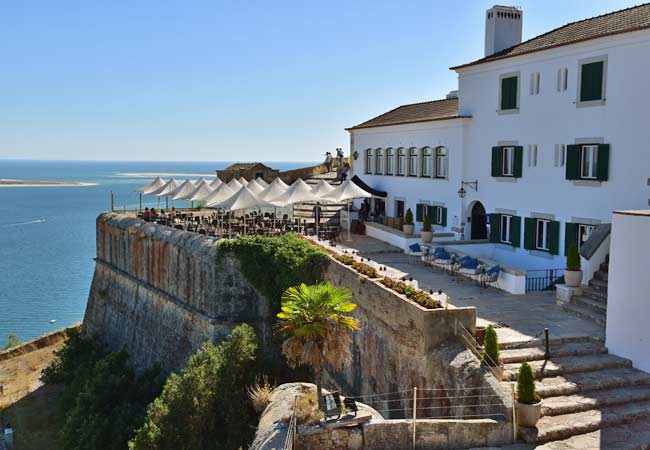
Mercado do Livramento: Housed in a striking 1930s building, this market stands as one of Portugal's finest with its extensive fresh fish section, local produce stalls and regional crafts. Visit early in the morning to experience the vibrant market atmosphere.
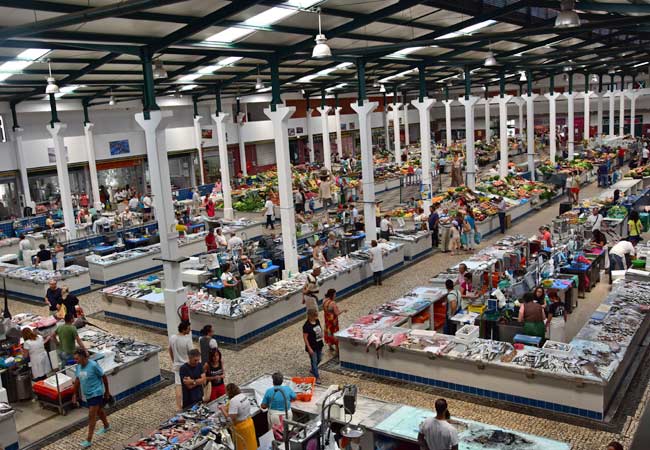
Museu do Trabalho Michel Giacometti: A former sardine factory that tells the fascinating story of Portugal's canning industry. The preserved machinery and tools provide genuine insights into the Setubal’s industrial heritage.
Igreja de Jesus: The first example of the Manueline style of architecture in Portugal, which would later adorn the great buildings of the early 16th century. The interior of the church features twisted columns and intricate stonework, representing the dawn of Portugal's Age of Discovery.
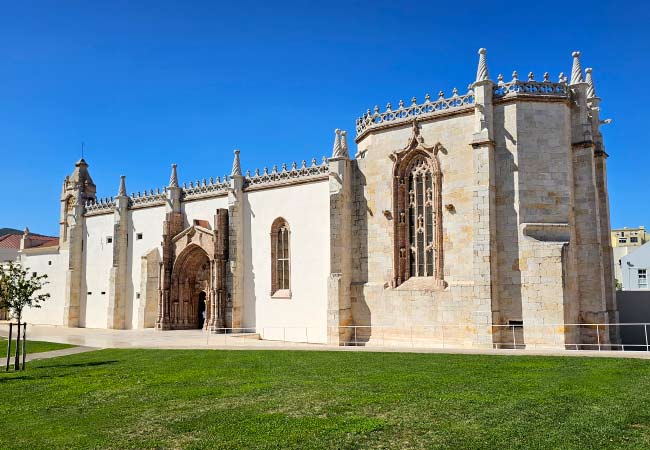
Boat Tours of the Sado Estuary: Observe the resident pod of bottlenose dolphins in their natural habitat during a cruise the tranquil waters of the Sado Estuary. Departing from Setúbal's harbour, these tours explore the estuary's rich ecosystem, where diverse marine life and migratory birds thrive in the protected waters.
Choco Frito: A local speciality of Setúbal, featuring tender cuttlefish coated in a crispy batter and deep-fried until golden. Traditionally served with hand-cut chips and zesty garlic sauce, this dish has humble origins but has become one of the region's most beloved seafood offerings.

Seafood Restaurants – Setubal is renowned for its excellent seafood restaurants, serving the day's catch at inexpensive prices. Local favourites Bombordo, O Alface, O Miguel, Âncora Azul and Peixoco line the waterfront, offering fresh fish straight from the fishing boats.
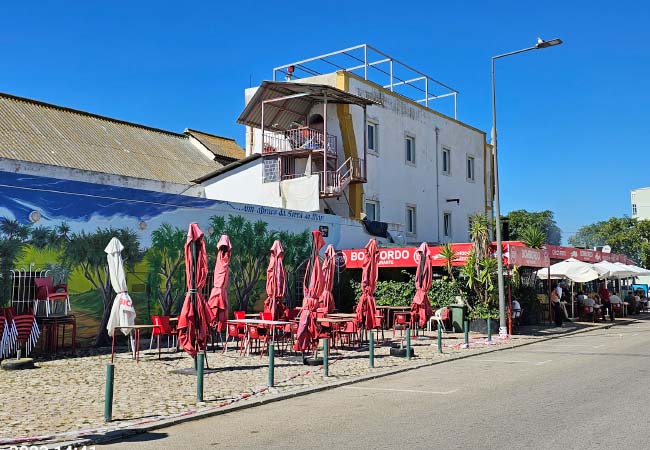
The best sights of the Setubal region
Beyond the city limits, Setubal's surrounding landscapes unfold into a region of natural wonders and cultural treasures. From wild Atlantic headlands to ancient wine estates, the region offers some of Portugal's most striking coastal scenery.
Estrada de Escarpa: This coastal road (the N379) through the Arrabida Natural Park offers unmatched views of limestone cliffs and the Atlantic Ocean.
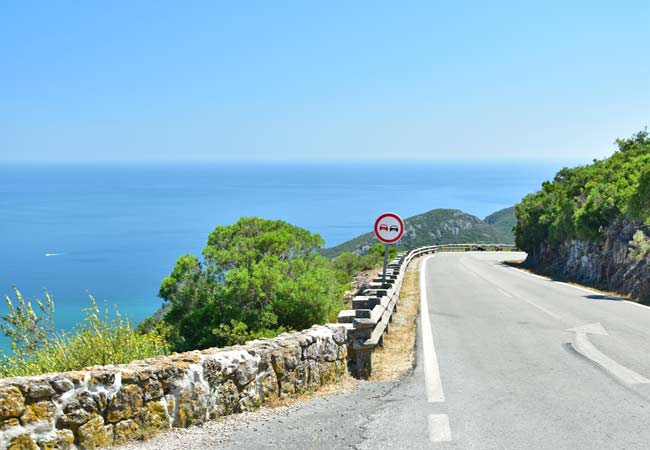
Azeitão Wineries: Two historic estates, José Maria da Fonseca and Bacalhôa, offer tours of their traditional cellars where the region's acclaimed Moscatel wines are produced along with wine tasting experiences.
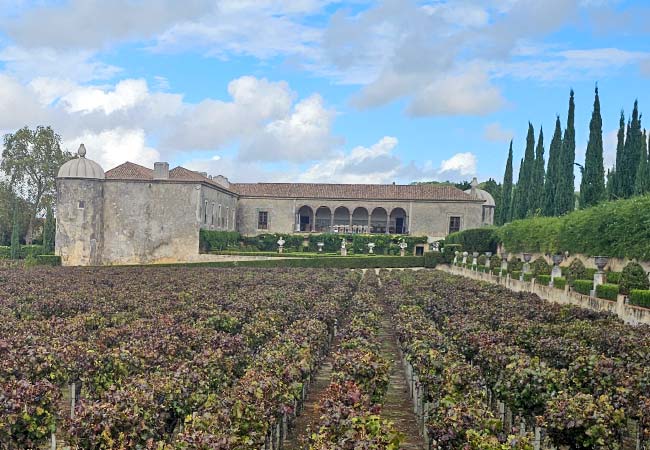
Troia Peninsula: Picturesque sandbar peninsula with a 15-km-long stretch of sand, Roman ruins and pristine pine forests. To the north are glorious sandy beaches loved by the residents of Setúbal, while to the south are the secluded holiday villas of the rich and famous. (Guide to Troia)
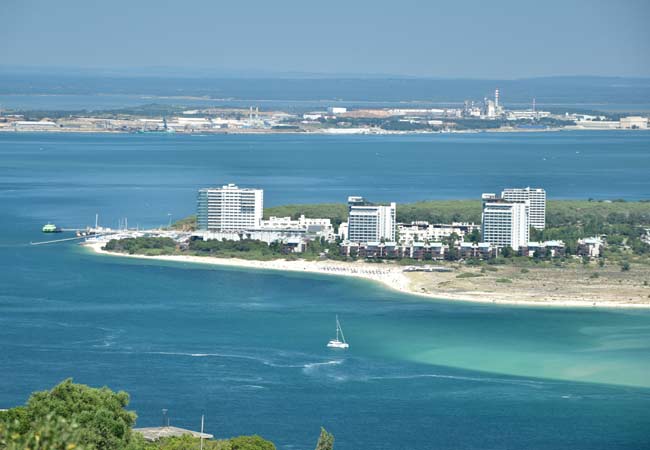
Portinho da Arrábida: A string of secluded beaches set against dramatic limestone cliffs. The crystal-clear waters, soft sands and stunning scenery make these some of Portugal's finest beaches.
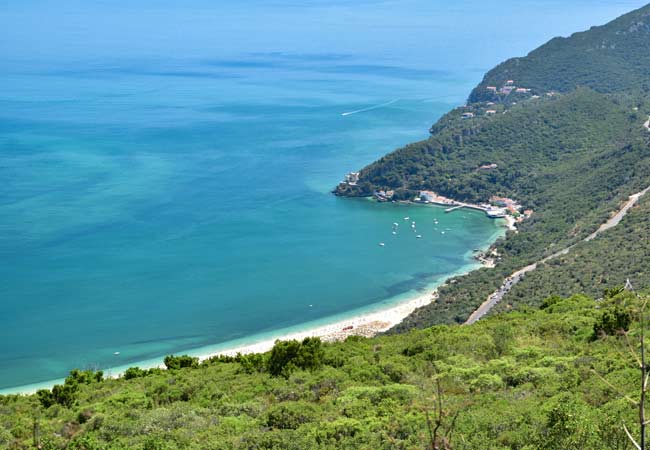
Sesimbra: A traditional fishing town blends its maritime heritage with modern beach life. Its medieval castle, bustling fishing port and excellent seafood restaurants make it a compelling day-trip destination. (Guide to Sesimbra)
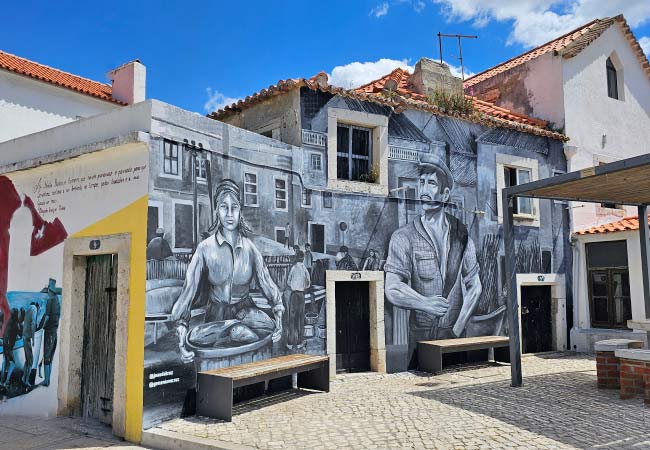
Cabo Espichel: A wild, windswept headland where cliffs plunge into the Atlantic. The isolated sanctuary complex includes an 18th-century lighthouse, ancient dinosaur footprints, and a baroque pilgrimage church. (Guide to Cabo Espichel)
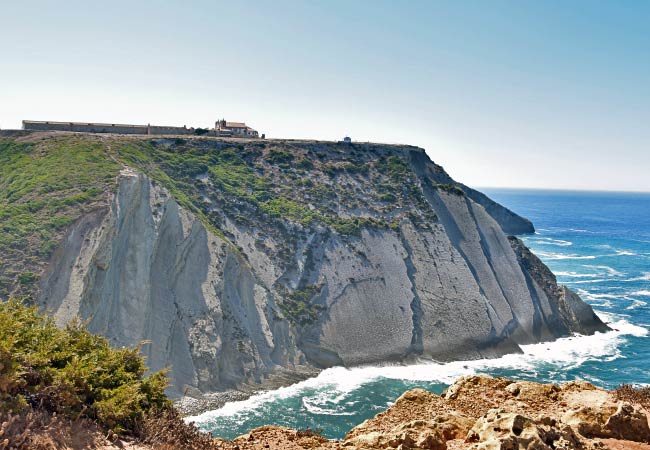
Castelo de Palmela: A heavily fortified medieval fortress, positioned atop the Serra de Palmela, offers panoramic views across the Tagus, Sado and Setúbal valleys. (Guide to Palmela Castle)
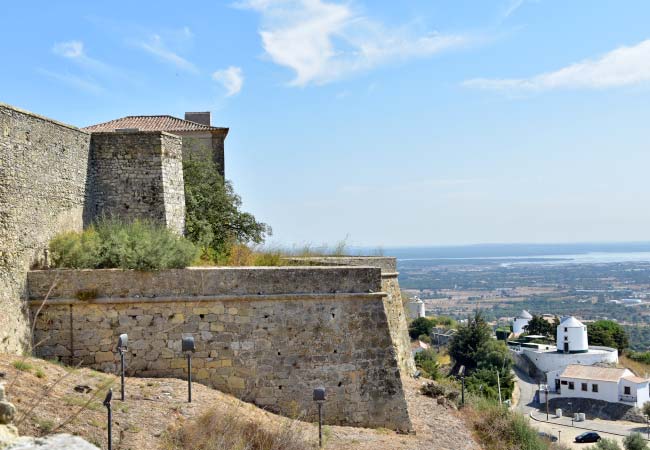
The interactive map below shows the location of the main sights of Setubal. Note: zoom out to see the sights of the region.
Legend:
1) Forte de São Filipe
2) Mercado do Livramento 3) Museu do Trabalho Michel Giacometti
4) Mosteiro de Jesus 5) Doca do Comercio 6) Doca de Pesca 7) Troia Ferry terminal 8) Jardim Engenheiro Luís da Fonseca
9) Igreja de Santa Maria da Graça
10) Câmara Municipal de Setúbal
11) Praça de Bocage
12) Igreja de São Julião 13) Praia de Albarquel (beach) 14) Parque Urbano da Albarquel
Sights of the Setubal region: 15) Estrada de Escarpa
16) Azeitão Wineries - Bacalhôa 17) Troia
18) Portinho da Arrábida
19) Sesimbra
20) Cabo Espichel 21) Castelo de Palmela
Seafood Restaurants: 22) Bombordo 23) O Alface 24) O Miguel 25) Âncora Azul 26) Peixoco 27) Pérola da Mourisca
The best activities of Setubal
From the calm waters of the Sado Estuary to the dramatic cliffs of Arrábida Natural Park, Setubal offers an exciting range of outdoor adventures. Whether you're seeking marine wildlife encounters, adrenaline-fueled climbs, or underground explorations, these activities show the region's passion for excitement and outdoor pursuits.
Dolphin Watching Tour: A marine biologist-guided excursion aboard a hybrid-electric catamaran in Setúbal Bay. This eco-friendly adventure combines wild dolphin spotting with underwater viewing rooms, while offering swimming stops along Arrábida's stunning coastline. (Full information here)
Via Ferrata Adventure: A guided climbing experience in Arrábida Natural Park that combines traversing equipped rock faces with dramatic rappelling descents. (Full information here)
Paragliding Experience: A thrilling tandem flight above the stunning coastline and Serra da Arrábida with an experienced instructor. During the 30-minute flight, you can choose between gentle sightseeing or exciting acrobatic manoeuvres while enjoying panoramic views. (Full information here)
Adventure Circuit: A complete outdoor challenge combining climbing, abseiling, and via ferrat (iron path) routes through Arrábida Natural Park's dramatic rock formations. This 4-hour guided experience is suitable for the inexperienced while offering unique views of the park's ancient geology. (Full information here)
Cave Exploration: A guided underground adventure through Arrábida's ancient cave systems with expert speleologists. This experience combines basic climbing techniques with fascinating geological insights as you explore hidden caverns and underground galleries beneath the natural park. (Full information here)
Sights of Setubal
The Fortaleza de São Filipe
The Fortaleza de São Filipe stands guard over Setúbal from its commanding position on a hillside, offering sweeping views across the Sado Estuary and the Atlantic Ocean. Built between 1582 and 1600 under Philip II of Spain's orders, this impressive fortress served as both a military stronghold and a symbol of Spanish dominance during the Iberian Union period.
The fortress's solid walls were built to withstand cannon attacks, with its star-shaped design enabling defenders to cover all angles of approach. Inside, visitors can explore the former barracks, ammunition stores, and the Capela de Santa Catarina with its beautiful Azulejo tile paintings. Among the fortress's most impressive original features is its sophisticated cistern system, which kept the garrison supplied with fresh water and can still be seen today.
During your visit, you can walk the historic ramparts, explore the Capela de Santa Catarina and enjoy refreshments at the Cafeteria Forte de São Filipe, where the terrace provides one of the finest panoramic views over Setúbal. The fort is free to visit.
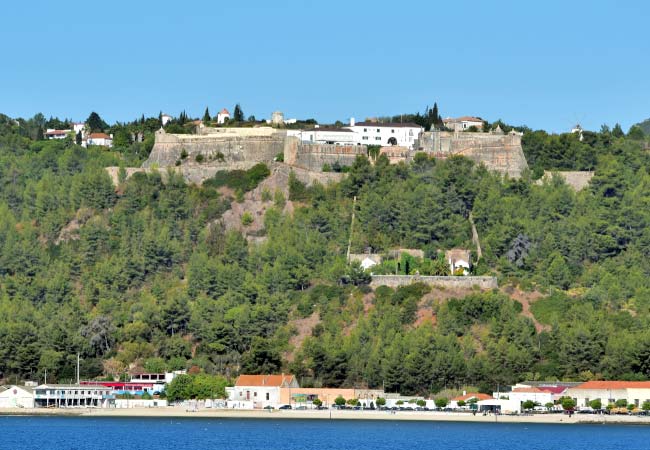
The fort both guarded the entrance to the Sado estuary and ensured Setúbal was loyal to the Spanish rule of the era
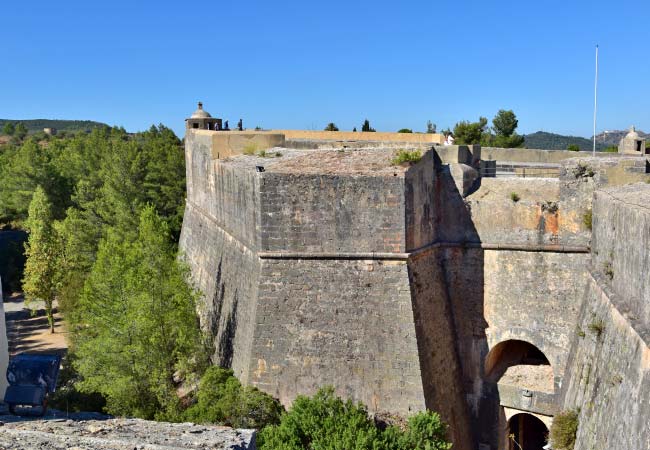
The solid defences of the fort are intertwined with the rock outcrop it sits upon
The Igreja de Jesus Church
The Igreja de Jesus stands as the most architecturally significant building in Setúbal. Built between 1490 and 1495, it represents the earliest example of the Manueline style of architecture in Portugal - a distinctive 16th-century style characterised by intricate stone carving that reflects Portugal's maritime discoveries.
The entrance to the Igreja de Jesus influenced many subsequent Manueline buildings, though it remains unfinished. The architect, Diogo de Boitaca, used this church as his experimental work before receiving the commission for the Mosteiro dos Jerónimos in Lisbon.
The exterior maintains Gothic minimalism except for the ornate main entrance, which despite being incomplete and weathered, displays intricate stonework. The interior features six twisted columns supporting the vaulted roof, with geometric azulejo tiles in green adorning the altar walls. The original 14 paintings that once surrounded the altar, dating from the 16th century, are now preserved in the Galeria Municipal.
The building served as part of a convent complex dedicated to Jesus, founded by Justa Rodrigues Pereira, who was a close aide to King Manuel I. The chapel houses the tomb of its founder and features detailed stone carving work around its arches and capitals.

The exterior of the Igreja de Jesus incorporates gothic and Manueline styles
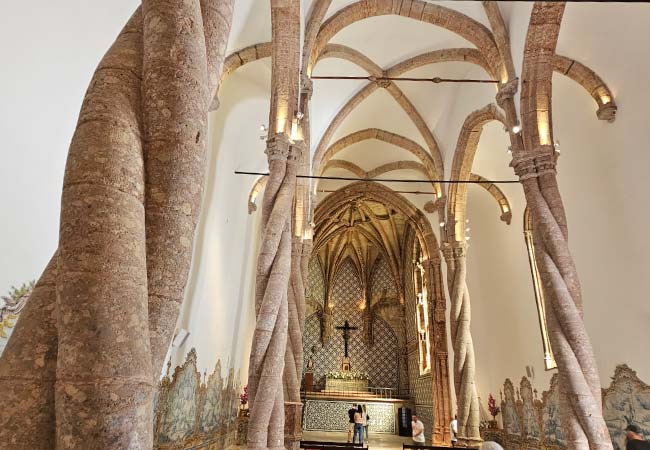
The Praça de Bocage
The elegant Praça de Bocage stands as heart of Setúbal's historic centre, where narrow shopping streets converge to create this grand open plaza. The square is dominated by two striking buildings: the distinctive purple-façaded Município de Setúbal (City Hall) and the historic16th-century Igreja de São Julião.
At the square's centre stands a bronze statue commemorating its namesake, Manuel Maria Barbosa du Bocage (1765-1805). Born in Setúbal, Bocage became one of Portugal's most intriguing Neoclassical poets, known for his provocative verses and controversial lifestyle.
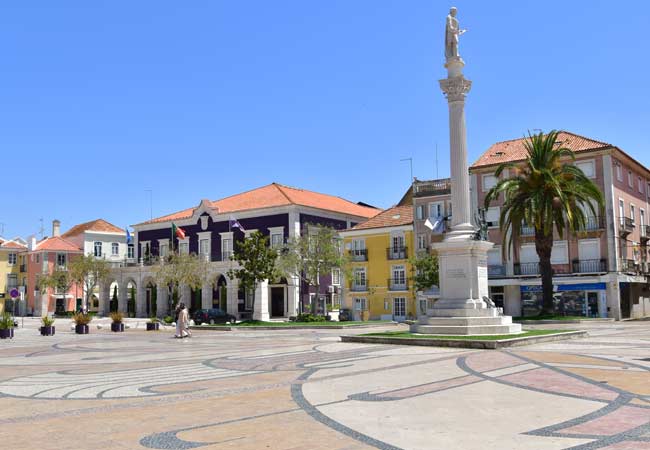
The Praça de Bocage and the statue of Manuel Bocage
The Mercado do Livramento
The Mercado do Livramento ranks among Portugal's finest traditional markets, and is housed in a striking 1930s building. The market's grand Art Deco façade leads into a cavernous interior where two floors buzz with trading activity.
The ground floor centres on an extensive fresh fish section, where seasoned vendors display the morning's catch from Setúbal's fishing fleet. The market's reputation for exceptional seafood has earned it recognition as one of Europe's finest food markets.
Beyond the fish section, stalls overflow with seasonal produce from the fertile Setúbal Peninsula. Local farmers bring fresh vegetables, fruits, and herbs, whilst other vendors offer regional cheeses, cured meats, and traditional preserves. The upper floor houses small cafés and specialist food shops.
Trading hours run from early morning until around 2pm, with the most vibrant atmosphere before noon. For the finest selection and to experience the market at its most authentic, visitors should aim to arrive before 10am.
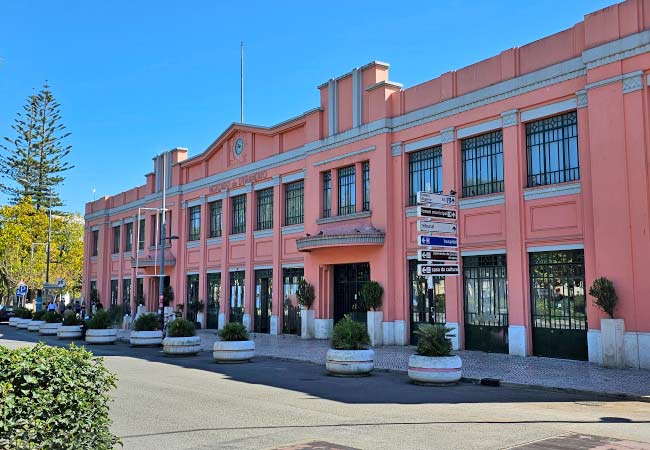
The Mercado do Livramento, Portugal's busiest indoor markets
The water front of Setubal
Setúbal's waterfront stretches along the northern edge of the Sado Estuary, offering an engaging blend of maritime activity and leisure spaces. This is a very pleasant and interesting route to wander along on a sunny day.
The eastern section begins at the Doca de Recreio das Fontainhas, the departure point for the car ferries that connect to the Tróia Peninsula. This modern marina houses pleasure craft and provides services for visiting boats.
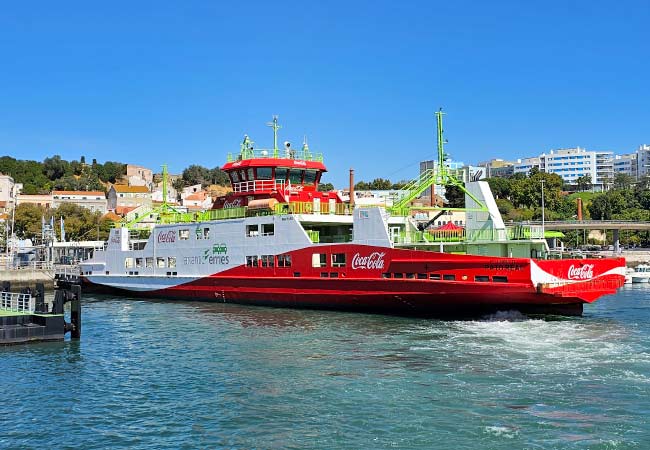
Moving westward, visitors encounter the catamarans' terminal, followed by the Jardim Engenheiro Luís da Fonseca. This well-maintained park provides shaded benches and uninterrupted views across the estuary, where bottlenose dolphins can often be spotted playing in the waters.
Beyond the park lies a working maritime zone, with its fish processing facilities and loading bays – a reminder of Setúbal's continuing role as one of Portugal's major fishing ports. The route continues to the Doca dos Pescadores, where fishing boats moor alongside whimsical dolphin sculptures that pay tribute to the area's marine heritage.
The western stretch encompasses the Albarquel Urban Park, a modern recreational space, before reaching the Praia da Saúde. This city beach offers cooling waters and views towards the Arrábida mountains. The entire waterfront walk spans approximately 2km.
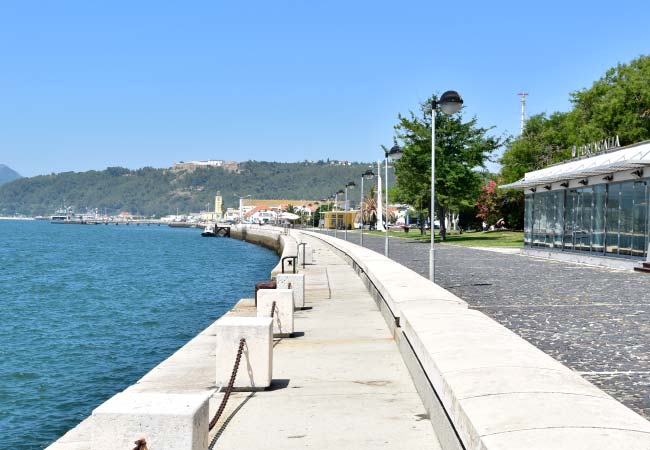
The Jardim Engenheiro Luís da Fonseca park and Setubal water front
Setubal seafood restaurants
Setúbal's waterfront is home to several exceptional seafood restaurants that showcase the city's rich maritime heritage and fresh catches.
Bombordo is renowned for its mastery in grilled fish, offering a traditional seafood experience. The restaurant is part of a family culinary tradition, where the son runs the nearby O Tavira (which is equally good).
O Miguel is situated by the fishermen's dock and specialises in seafood and fish, including specialities such as tuna steak, razor clam rice and rich cataplanas. Âncora Azul, which is part of the Setúbal Naval Club, is popular for its all-you-can-eat fish grill (rodízio de peixe), offering an exceptional deal where diners can indulge in unlimited freshly grilled fish.
Peixoco combines Portuguese traditions with contemporary flair, focusing on sustainable fishing practices and innovative preparations of local fish. O Alface is a true local favourite, known for its fresh catches and exceptional value, with a bustling atmosphere, fast service and authentic Portuguese character.
Away from the waterfront, Pérola da Mourisca is located in the far east of Setubal and is celebrated for both its fresh seafood and grilled meats in a rustic setting.

Museums of Setubal
Setubal has a decent selection of museums and art galleries, some of the most famous and popular include.
The Museu do Trabalho Michel Giacometti
Sardine canning may not sound an interesting subject, but the Museu do Trabalho Michel Giacometti is a gem of a museum. This industry was once critical to Setubal’s economy, and the museum, which is housed in an abandoned canning factory, details the tough life from the perspective of the workers.
On the upper floors is a re-creation of a 1900 Lisbon grocery store. The Trabalho museum is the perfect attraction for when the heat of the day gets too much. The entrance fee is €1.50 and it is located to the east of the city ).
The Casa Bocage
The Casa Bocage museum celebrates the life and works of the poet Manuel Bocage. The museum is located in the house that he was born in, in1765. The entrance fee is €1.50
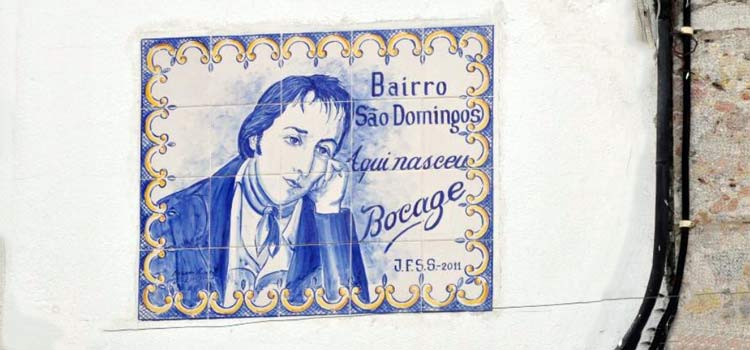
Galeria Municipal
The Galeria Municipal is housed in a beautiful rose painted building, which was originally the bank of Portugal. This converted bank is now the general museum of Setubal, and includes an archaeological section (covering Greek/Roman/Middle East), art galleries and temporary exhibits.
This museum is the temporary home of the Galeria da Pintura Quinhentista collection while the museum is being rebuilt (correct 2018). This collection includes the magnificent 14 paintings that hung in the altar of the Igreja de Jesus. For this one collection alone the Galeria Municipal (€1.50) is highly recommended.
The Albarquel Urban Park
Setubal’s urban park is incredibly scenic as it extends along the banks of the Sado Estuary. The park is filled with grassed areas, urban art and incorporates the Praia da Saúde beach. The park is pleasant location to stroll through and offers pleasnt views over the estuary and the Troia Peninsula.
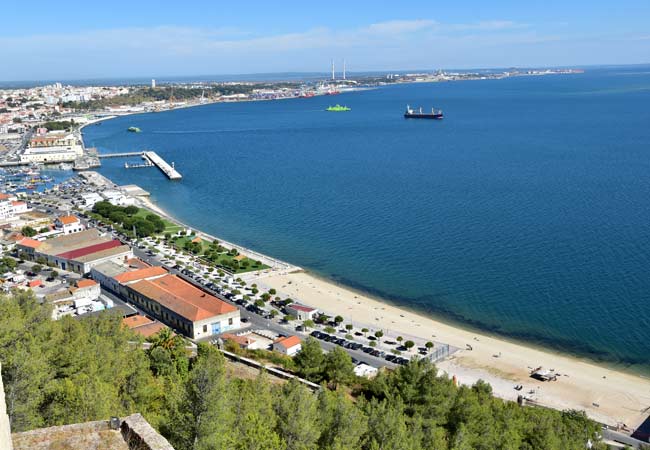
The Albarquel Urban and the Praia da Saúde, as seen from the Fortaleza de São Filipe
Parque do Bonfim
Within the shaded Parque do Bonfim are the unique ceramic statues of the Pasmadinhos. These large and colourful statues depict traditional professions of the Setubal region or local heroes (such as Bocage) and were created by the artist Maria Pó. Similar to the Albarquel Urban Park, this is a peaceful setting after a long day’s sightseeing.
Things to do – The beaches of Setubal
Setubal should never be considered as a beach resort, but close to the city are some of Portugal’s finest beaches. The beautiful stretches of coastline include the Troia Peninsula and the Portinho da Arrábida (coastline of the Serra de Arrabida), while within walking distance of Setubal city centre are the Praia de Albarquel and the Praia da Saúde beaches.
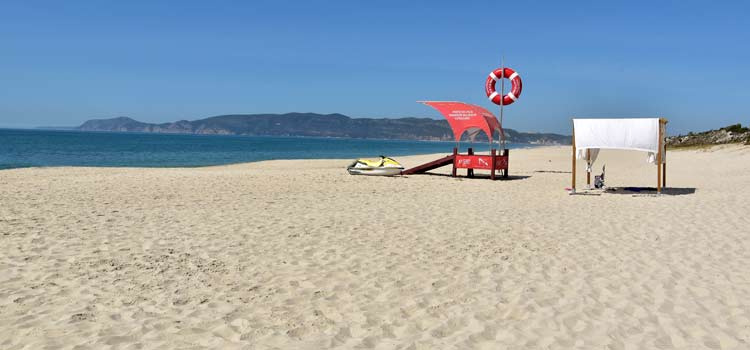
The idyllic Praia Atlantica de Soltroia on the Troia Peninsula
The Troia Peninsula is lined with pristine sandy beaches and the resort town has an exclusive upmarket vibe while inland are hidden luxury villas of Europe's super-rich. It is very easy to reach Troia from Setubal, as there is a regular ferry service which crosses the Sado Estuary.
The stunning beaches of the Portinho da Arrábida are to the west of Setubal and offer turquoise seawaters, soft golden sands and the beautiful backdrop of the Serra de Arrabida hills. The Portinho da Arrábida beaches include the Praia do Creiro, Praia dos Galapinhos and Figueirinha beaches. For a full guide to Setubal’s beaches please click here.
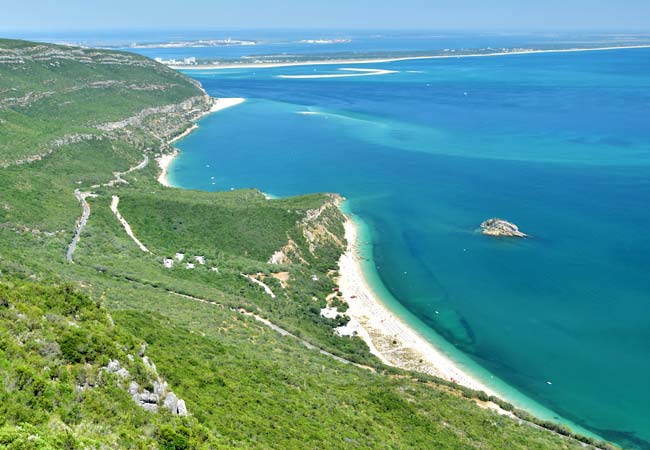
The stunning Portinho da Arrábida coastline
Hiking in the Serra da Arrabida
The Arrabida national park offers some fantastic hiking trails through the pine-covered hills of the Serra da Arrabida. Popular signed hiking routes depart from the northeastern town of Palmela or around the Convento da Arrabida. These shorter hikes provide stunning views over the Sado estuary.
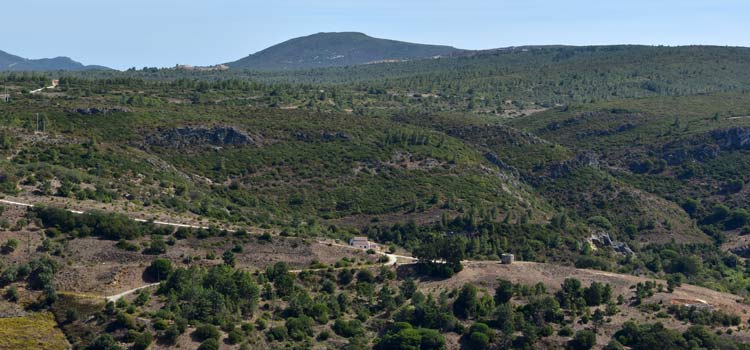
The lush forests of the Arrabida national park
Dolphin watching tour in the Sado Estuary
The Sado estuary is home to a growing population of bottle-nose dolphins and half day boat cruises go in search of these elusive animals. Even if the dolphins are not spotted, the journey still offers beautiful views of the estuary.
The estuary is part of the Reserva Natural do Estuário do Sado, which has greatly improved over the last few years and now colonies of birds including flamingos have started to thrive.
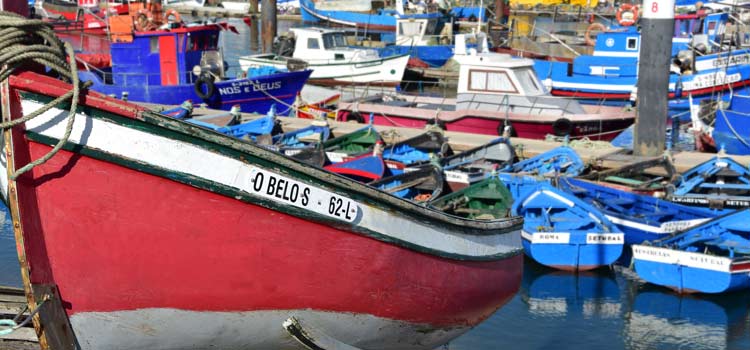
The colourful fishing fleet of Setubal
The Castle of Palmela
The Castelo de Palmela stands high above the plains of central Portugal on the easternmost edge of Serra da Arrabida. Palmela castle commands amazing panoramic views and is a perfectly maintained castle that is surprisingly untouristy. In the castle, the battlements, church and keep can be fully explored, but the main draw are the wonderful views over central Portugal.
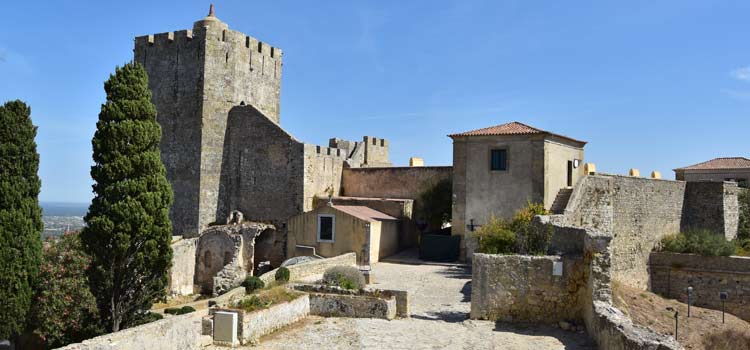
The ancient Castelo de Palmela
Our most popular guides to the Setubal region
Discover more of Portugal with our guides
Expert Insight: These guides are curated by Philip Giddings, a travel writer with over 25 years of local experience in Portugal. Since 2008, Phil has focused on providing verified, on-the-ground advice for the Setubal and Sesimbra region, supported by deep cultural ties through his Portuguese family. Read the full story here.
























